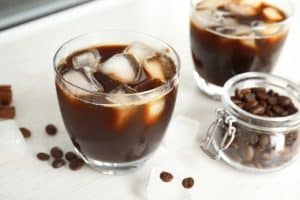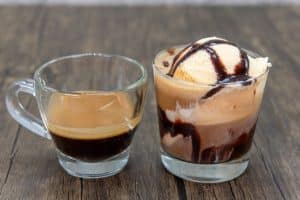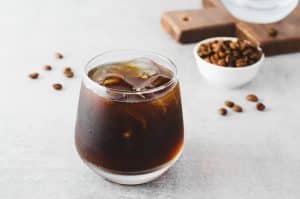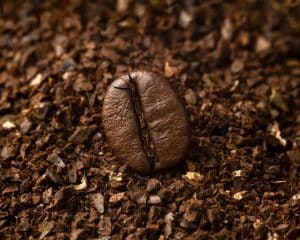The Right French Press Grind for the Perfect Brew

Every coffee lover knows that it takes freshwater, correct temperature, a quality French press, and the right coffee beans to come up with a strong, delicious cup of Joe. But that’s not where it ends. For that coveted rich and bold flavor, the grind size has to be perfect–but what is the best grind for a French press, anyway?
Before you take a guess, let’s get one thing out of the way. There’s not a lot of room for error when it comes to grinding coffee beans. You may get everything else right, but all your efforts will go to waste if the grind size is wrong.
The good news? You have come to the right place for direction on coffee grind levels for the French press. Fortunately, it’s not really as sophisticated as it sounds; keep reading, and you’ll find out how to make the best French press coffee like a pro!
What Grind Size Is the French Press Grind?
Coffee grinds range from fine to coarse with various levels in between. The grind level you choose all depends on the coffee preparation method you are using.
Fine grinds are a bit smooth and powdery, while coarse grinds feature larger particles, similar to those of sea salt. With a French press, the rule is this simple: the more coarse your grounds are, the better the coffee.
If you’ve bought coffee beans for French Press, make sure you use a quality burr grinder to prep your coffee for brewing. Study the various settings to understand which one to use for your French press. Be careful not to end up with grounds that are too coarse because water will quickly rush through them and fail to pick up all those sweet and bold flavors we all cherish.
Take your time to also fully understand the various coarse grind levels your burr grinder can yield. Keep this in mind: the more coarse your grind is, the longer the extraction time. Let’s look at each of them briefly.

Coarse Grounds
Coarse grounds have the same size and shape as chunky sea salt. This ground level is perfect for French presses and will only take around four minutes to brew.
Medium-Coarse Grounds
These grounds have roughly the same consistency as grains of sand and only take about two minutes to brew. They are primarily used in specialty devices such as Chemex brewers and when making cafe solo.
Extra Coarse Grinds
Extra coarse grounds resemble peppercorns in size and shape. On most burr grinders, this is the farthest you can go when it comes to coarse grind levels. Because the extraction time is longer (up to 12 hours), such a grind is best for cold brews or French press iced coffee.
Additionally, never forget that extraction time matters a lot. Under-extracted French press coffee tends to be sour, salty, and acidic, while over-extracted coffee will only be bitter without any of the usual cherished coffee flavors.
So, what’s the science behind using coarse grinds for a French press? Let’s find out.
Why Coarse Is the Perfect French Press Coffee Grind Level
Earlier on, I mentioned that coarsely ground coffee beans yield the most delicious French press coffee. Well, it’s true, and here’s how and why that happens.
By now, you are familiar with the extraction stage in the coffee-making process. For starters, this is when water passes through your ground coffee beans, drawing out your desired flavors. Now, a lot can happen during this moment that determines the kind of coffee you end up with.
For example, a French press uses minimal pressure to pass the water through the coarsely ground coffee. You could use a fine grind, but this will only lead to over-extraction. There’s also the possibility of the grinds getting stuck in the mesh of your French Press coffee maker or finding their way into your cup, which nobody wants.
However, if you use such grounds in an espresso machine, the outcome will be perfect because it extracts in just 20 to 30 seconds.
Now, back to a coarse grind and why it’s so necessary for French press brewing. First of all, it gives your French Press enough time to extract more flavor from the beans. Another reason for using such grounds is so the plunger encounters a bit of resistance when you press it down.
Buying Coarse-Ground Coffee

Of course, a burr grinder makes coffee-making easier. All you have to do is dial in a setting, depending on your brew method, and the grinder does the rest. But should you be worried if you lack one? Absolutely not!
You always have another option, which is to buy ground coffee for your French press, or have your beans ground to the right size at the place where you buy them. This, however comes with a downside.
First, not all coarsely ground coffee beans you see in online stores and coffee shops are perfect for your French press. You have to do a bit of research and leg work to land on the best option for you and your press.
Freshness is top on the list of things you have to pay extra attention to. Look at the packaging date, and always go for the most recent bag you can find. Coffee that is older than four weeks has most likely lost some of its complex flavors.
Other factors to watch out for include:
- Roast date
- Is the package properly sealed?
- Where is the coffee from?
FAQs on French Press Grind
Can I use Starbucks ground coffee in a French press?
The answer is yes! Starbucks has a variety of coffee beans ground for different brewing methods, including the French press grind. Starbucks’ Dark Roast Ground Coffee (Sumatra) is one of their most popular options you can count on for a quality French press coffee. It’s known to yield coffee that has a fuller flavor and lots of complex, tasty flavors.
How do I know if my coffee is coarse ground?
The easiest way to know if your beans are coarsely ground is to check the shape and size of your final product. If the grounds resemble and have the same consistency as chunky sea salt, then you have the perfect grind. You should also be able to see individual granules of your coffee beans and notice the variation in color.
How do you make coffee with French press ground coffee?
First, make sure you have fresh water, a measuring tablespoon, a coffee stirring spoon, and a kettle to boil the water. Next, follow these steps to make coffee with your French press ground coffee.
- Preheat your French press by adding some warm water to the beaker
- Get the right proportion of coffee beans (this should be based on the amount of coffee you want and the size of your French press)
- Boil the water to a temperature of about 195 degrees Fahrenheit
- Drain the warm water in your French press, and then place the ground coffee beans
- Put the lid back on and wait for four minutes
- Gently press the plunger down
Your french press coffee is ready to be served!
What is stronger: coarse or finely ground coffee?
The strength of your coffee depends on so many factors, from the type, quality, and origin of your coffee beans to the roast level. Now, these factors will be outside your control once you have purchased your coffee beans, but one thing remains that determines how strong or weak your coffee could be: grind size.
As the extraction takes place, caffeine is produced from the beans. The use of hot water at a higher pressure creates the perfect environment for maximum extraction of caffeine and flavor from the grounds. That is why finely ground coffee will release more caffeine, leading to stronger coffee compared to coarsely ground coffee.
Last Word on the Best Grind for French Press
By now, we can all agree that coarse is the best French press coffee grind. This is not simply because coffee experts say so but due to the fact it delivers the most deliciously full-bodied coffee. You will also have an easier time brewing your French press coffee with coarse grounds.
Remember to get yourself the best burr grinder if you plan on grinding the beans on your own. There’s plenty of them on the market, but the search doesn’t have to be overwhelming; we already did the due diligence for you and have created a list of the best coffee grinders you can buy right now.
The same applies to buying pre-ground coarse coffee beans. Only settle for those that tick all the boxes with regards to all the factors we discussed here.
Now you are well informed about the various French press coffee grind levels. All the best in your French press coffee brewing experiences!
Owen is a writer and editor at Caffe Streets who considers himself a coffee fanatic. He spends his time researching and testing different coffee beans and brewing methods and sharing what he learns with others.





